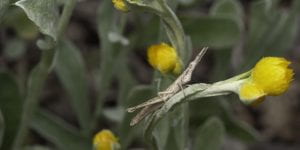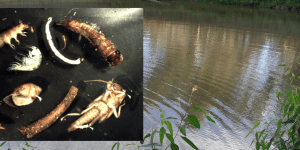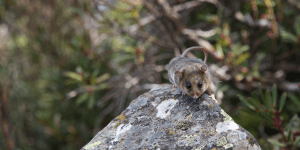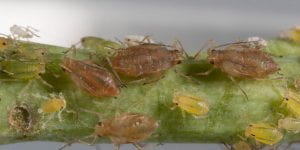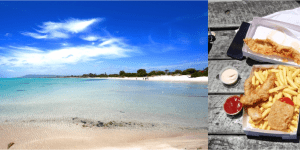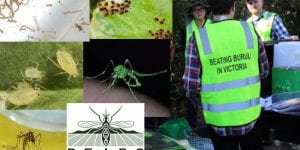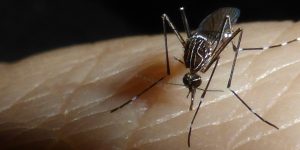Tag: field work
-
Mini-beast renaturing: A time for local action
This article was first published on Pursuit. Read the original article. Dr Michael Magrath, Dr Steve Sinclair, Hiromi Yagui, Professor Ary Hoffmann and Professor Michael Kearney Insects in our environment are unsung heroes. These ‘mini-beasts’ are often inconspicuous, but they may have a huge impact on the health of ecosystems that sustain humanity. They pollinate […]blogs.unimelb.edu.au/pearg/2021/11/08/mini-beast-renaturing-a-time-for-local-action
-
Variety is the spice of life… and key to saving wildlife
“This article was first published on Pursuit. Read the original article.” Dr Andrew Weeks and Professor Ary Hoffmann In the critical battle against extinction, conservationists use a variety of tactics to try to save species. One of the most fundamental tools is maintaining the amount of variation of genetic material (DNA) in a group of […]blogs.unimelb.edu.au/pearg/2021/06/10/variety-is-the-spice-of-life-and-key-to-saving-wildlife
-
The complexities of predicting climate change effects
This article was first published on Pursuit. Read the original article. Words: Dr James Camac, Nicholas Bell and Professor Ary Hoffmann We currently face significant challenges to accurately predict the impacts of our changing climate on individual species, as well as their ecosystems. A recent report on the demise of an area of snow gums […]blogs.unimelb.edu.au/pearg/2021/03/31/the-complexities-of-predicting-climate-change-effects
-
Uninvited guests in your groceries
Words, illustraions and photos: Marianne CoquilleauMarianne Coquilleau With spring coming our way, gardens come to life and with it their many inhabitants. It’s no surprise then to find small caterpillars, aphids and other insects while washing your vegetables and fruits, especially if you source your vegetables locally or pesticide-free sources. You might then also notice […]blogs.unimelb.edu.au/pearg/2020/09/17/uninvited-guests-in-your-groceries
-
Targeting the bacteria inside insects for improved pest management
This article was first published on Pursuit. Read the original article Francesca Noakes and Professor Ary Hoffmann Any home gardener knows of the long-running battle against insect pests. The little critters that sneak into your garden beds and strip leaves are irritating among prized kale, but for farmers these tiny pests can have devastating economic […] -
Looking for a funded PhD or MPhil scholarship?
The Australian Grains Pest Innovation Program (AGPIP) is offering 4 fully funded scholarships at the University of Melbourne for potential PhD or MPhil students interested in cutting-edge science, environmental sustainability and agricultural innovation. AGPIP is a collaboration between the PEARG and cesar. The program is aimed at improving the sustainability of invertebrate pest management practices […]blogs.unimelb.edu.au/pearg/2020/04/06/looking-for-a-phd-or-mphil-scholarship
-
Sampling by the sea – collecting mosquitoes in the Mornington Peninsula
Words and images: Véronique Paris It’s 7.30 Saturday morning – what are your plans for the day? While you may be still in bed contemplating a coffee, or still sound asleep, I’m packing the PEARG ute with a stack of small buckets, strips of red felt, some rabbit food, and a 20lt jerrycan of water. […] -
MSc projects 2020 – Students wanted
We are seeking motivated MSc students to apply for several projects starting next year. Enquiries via pearg-queries@unimelb.edu.au Project 1/4: Exploring bacterial symbionts for agricultural pest control PEARG is researching ways to control important agricultural pests such as aphids and mites that cause millions of dollars in damage to crops each year in Australia. This project […]blogs.unimelb.edu.au/pearg/2019/06/14/msc-projects-2020-students-wanted
-
NEW PROJECT | Buruli ulcer
Words and photo: Jason Axford On 26 April at the Peter Doherty Institute, Federal Minister for Health, Greg Hunt, announced new NHMRC funding to investigate the mysterious and rather horrific disease commonly known as Buruli ulcer (BU) (formerly known as Bairnsdale ulcer). The project is led by Prof. Tim Stinear in the Department of Microbiology […]blogs.unimelb.edu.au/pearg/2018/05/10/new-project-buruli-ulcer
Number of posts found: 12
